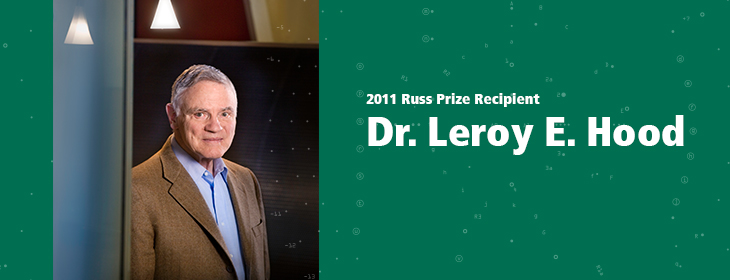2011 Russ Prize
Leroy Hood, president and co-founder of the Institute for Systems Biology, revolutionized biomedicine and forensic science with his development of the automated DNA sequencer, which made possible the mapping of the human genome within an incredible 10 years rather than a century. For this groundbreaking development, he was awarded the 2011 Fritz J. and Dolores H. Russ Prize presented by the National Academy of Engineering and Ohio University.
The automated DNA sequencer accelerated the field of genomics with rapid, automated DNA sequencing that has had a profound impact on research in many fields. More than 1,000 genomes have been mapped using this technology, and it has led to another advancement with expressed sequence tagging, which helps predict gene function and opened the door to developing personalized medicine and new treatments for diseases with genetic bases. Hood’s work has also changed pharmaceutical manufacturing, measuring an economic impact in the hundreds of billions of dollars.
Building on his research interest in genetics, Hood developed the sequencer in the 1980s with a team at the California Institute of Technology. He founded Applied Biosystems, Inc., in 1981 to develop a commercial application for the sequencer as well as three other instruments from the Hood lab.
Automated DNA sequencing eliminated the previously slow, laborious process of manual sequencing, which translated to 30 years in the lab to sequence the DNA of a cold virus. Hood’s technology sequences similar genomes in less than an hour.
Now at the helm of Seattle’s Institute for Systems Biology, Hood’s work also precipitated the idea of P4 medicine (a predictive, personalized, preventative and participatory approach), a system of personal genome sequencing used as a diagnostic and treatment tool allowing doctors to identify genetic variants they can act on to treat or cure diseases.
Hear Dr. Hood’s lecture on “Systems Biology, Emerging Technologies and the Transformation from Reactive to Proactive (P4) Medicine” presented Feb. 23, 2012 at Baker University Center Theatre. Below are resources related to his talk.
- Introduction of Dr. Leroy Hood by Goll-Ohio Professor of Molecular Biology John Kopchick - Streaming MP3 [7.33mb] (Right click to download)
- Lecture by Dr. Leroy Hood: “Systems Biology, Emerging Technologies and the Transformation from Reactive to Proactive (P4) Medicine” - Streaming MP3 [60.4mb] (Right click to download)
- Presentation deck by Dr. Leroy Hood [PDF]
